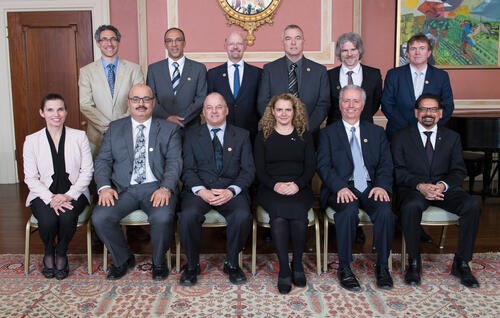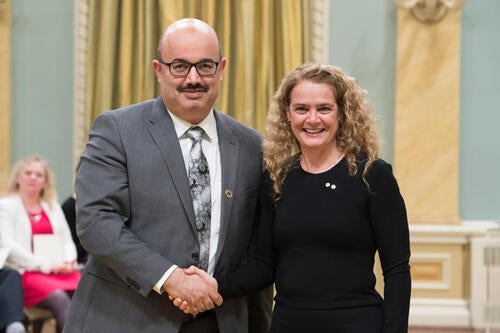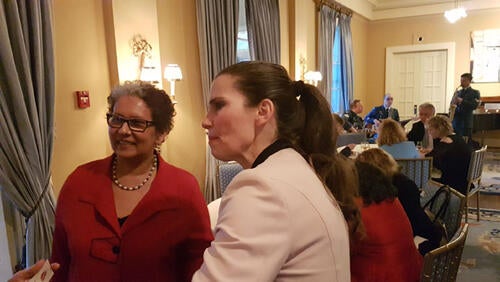
Researcher honoured at Rideau Hall for wireless work
Engineering Professor Slim Boumaiza received a $200,000 Synergy Award for Innovation from the Natural Sciences and Engineering Research Council of Canada (NSERC)

Engineering Professor Slim Boumaiza received a $200,000 Synergy Award for Innovation from the Natural Sciences and Engineering Research Council of Canada (NSERC)
By Staff Faculty of Engineering
Bottom row (from the left): Kirsty Duncan, Slim Boumaiza, John Ilowski, Julie Payette, Denis Jacques, Mario Pinto; Top row: Other award winners and industry partners. Photo credits: MCpl Vincent Carbonneau, Rideau Hall © OSGG, 2018
Waterloo Engineering Professor Slim Boumaiza has been honoured at Rideau Hall in Ottawa for his research on wireless communications networks with two industry partners.
Boumaiza, an electrical and computer engineering professor who heads the Emerging Radio Systems Group (EmRG), was one of 20 scientists and engineers recognized at a ceremony on May 1 attended by Governor General Julie Payette and other dignitaries.
He received a $200,000 research grant as the winner in one of four Synergy Awards for Innovation categories sponsored by the Natural Sciences and Engineering Research Council of Canada (NSERC) for outstanding examples of industry-academia collaboration.

Slim Boumaiza, left, head of the Emerging Radio Systems group (EmRG) at Waterloo Engineering, with the Governor General. Photo: Martin Lipman/NSERC
The award recognizes Boumaiza’s work with Ericsson Canada Inc. and Keysight Technologies Canada Inc. to find ways to build energy-efficient radio-communications systems that minimize the environmental impacts and operational costs of 4G infrastructure.
A citation by NSERC notes his research is paving the way for 5G, or fifth-generation, wireless networks, which involve “a combination of ingenuity and enterprise that can only be achieved by collaboration between industry and academia.”
In addition to setting the stage for 5G networks, it notes, Boumaiza and his industry partners are helping train the new engineers who will be at the forefront of wireless communications research and development in the future.

Charmaine Dean, left, Vice President of University Research, with the Governor General. Photo: Martin Lipman/NSERC
Ericsson is described as an industry leader with networking equipment that serves almost 40 per cent of mobile traffic in the world.
Keysight produces electronic design automation software and test and measurement instrumentation used in almost two-third of all radiofrequency communication hardware design.
The event at Rideau Hall honoured the winners of NSERC’s six national prizes totaling $3.72 million.
“NSERC award winners have demonstrated their critical thinking and creativity to produce breakthrough findings in response to new but also timeless research questions,” said B. Mario Pinto, president of the council.

Read more
Here are the people and events behind some of this year’s most compelling Waterloo stories

Read more
Meet five exceptional Waterloo graduate students crossing the convocation stage as Class of 2025 valedictorians

Read more
Twenty-six researchers receive federal funding to drive discovery, innovation and research infrastructure development
Read
Engineering stories
Visit
Waterloo Engineering home
Contact
Waterloo Engineering
The University of Waterloo acknowledges that much of our work takes place on the traditional territory of the Neutral, Anishinaabeg, and Haudenosaunee peoples. Our main campus is situated on the Haldimand Tract, the land granted to the Six Nations that includes six miles on each side of the Grand River. Our active work toward reconciliation takes place across our campuses through research, learning, teaching, and community building, and is co-ordinated within the Office of Indigenous Relations.